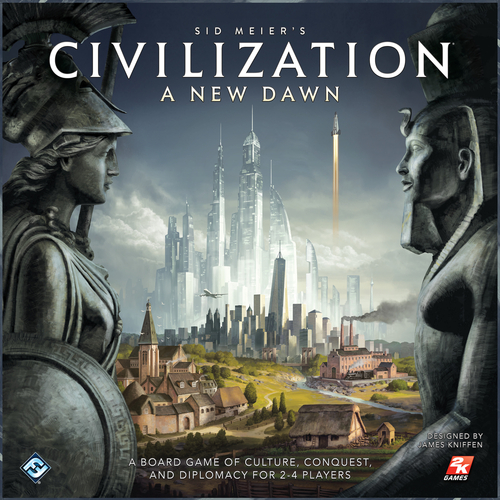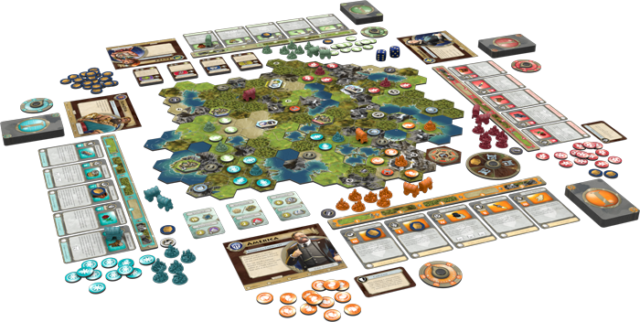
If there’s one thing we love to play here at TGR, it’s board games that have a crossover into the world of video games. Indeed, it was the Portal board game way a couple of years ago that brought us into the wild world of board gaming, and since then we’ve seen the likes of Doom and Fallout amongst others doing a great job of bridging the gap between the two styles of gaming. But the Civilization series is well known for its complex gameplay; these are games that keep you up all night while you try and finish off your assault on France, or keep you coming back and spending hours on your tech tree to see the best way of winning the space race. A few years ago a Civilization board game was released, and it maintained the complexity of the PC games to the point that it was inaccessible to all but the most hardcore board game obsessive. A New Dawn, however, goes about things differently and looks to streamline the Civilization experience into a far more playable game which clocks in at under a couple of hours, and given that the people I played this with (who aren’t Civ nuts like I am) happily played and enjoyed this I’d say it’s done its job admirably despite possibly losing a lot of what makes Civilization the game it is.
The key mechanic of the game comes down to the use of five cards covering Science, Economy, Culture, Military and Industry. These cards sit on a track running from 1 to 5 and lets you play one of the cards when it’s your turn. When a card is played it’s moved to position 1 and the others are moved up to fill the gap, and as a higher position on this track generally makes the cards more effective you might end up waiting a little while before choosing to use a certain action to make sure it’s got the power that you need. Wait too long and the game might have moved on to the point that it’s no longer useful to use that action, so there’s a fine balancing act. The cards allow you to carry out tasks such as setting up defences near your cities, take control of areas nearby or advancing your tech dial, which in itself will allow you at key points to upgrade your action cards.
These cards are central to everything you do in A New Dawn, whether that’s working with your trade caravans, attacking other cities or building wonders of the world, and it’s a really cool system that is easy to use and helps you focus more on strategy as opposed to skimming the rules every turn to find out what each option is available to you. It’s also one reason behind the fairly quick games – the box reckons between 1 and 2 hours per game, and that’s pretty spot on. We certainly didn’t go above 2 hours in any of ours. But that comes at a price, and it’s a price that Civilization fans might not like – in terms of Civilization, this game is very light on what you can do and how things progress. While the previous Civilization game was incredibly complex and daunting, it did at least reflect the PC game quite faithfully. Were it not for the name on the box it would be quite easy to miss the fact that this is even linked to Civilization; if anything it’d only be the barbarians roaming the board that would give it away. But there’s two sides to this.

As I mentioned in the review introduction, not everyone wants an overly complex game. Those who want that from a Civilization board game still have the option of playing the previous version and spending hours upon hours working through the game as it unfolds in front of you; A New Dawn is very much catering for those who like the idea of a Civilization type game but don’t want that in-depth monster of a title to figure out. And to that crowd, this game works really well. Those I tried it with weren’t familiar with the video game, and so enjoyed this as an easy to learn game whereby you can try to wipe out your friends’ cities and try to make yourself the most powerful player around, and that’s exactly who this game is aimed at. What will undoubtedly upset people who are really into both board games and Civilization is the fact that it’s streamlined to the point of losing its identity as a Civilization game. This is a civilisation building game, but I can’t see this as a Civilization game, and that’s what will probably piss a few people off. It’s also a little light on the combat side of things, relying on dice rolls to simply change which tiles you place on the board, or whether a city remains in your control or not, but again that’s conductive of a simpler kind of game.
I suspect that if you read a few other reviews (which I have a habit of avoiding while doing my own) you’ll find this to be a Marmite game, that players either really like or are really disappointed in. Go into this knowing that it’s a much lighter, laid back kind of game and you’ll get far more out of it as we did. Buy it hoping for a hardcore Civilization experience and you’ll never go back after your first game. It’s pretty good for what it is, but don’t expect something it isn’t meant to be.

Leave a Reply